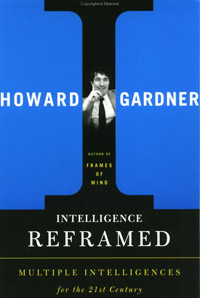By Howard
Gardner
 In the 20 years since it was introduced, Gardner's
theory has been slowly revolutionizing education, psychology and the
way we think about intelligence. His theory is succinct: instead of accessing "g",
a general intelligence that only runs from low to high on one scale,
the human brain really uses a number of different intelligences. In other
words, people aren't either smart or dumb, they are just each smarter
in different areas. Pretty straightforward.
In the 20 years since it was introduced, Gardner's
theory has been slowly revolutionizing education, psychology and the
way we think about intelligence. His theory is succinct: instead of accessing "g",
a general intelligence that only runs from low to high on one scale,
the human brain really uses a number of different intelligences. In other
words, people aren't either smart or dumb, they are just each smarter
in different areas. Pretty straightforward.
In this book specifically, Gardner only mentions the
previously-defined intelligences: spatial, linguistic, body/kinesthetic,
interpersonal, intrapersonal, musical and logical/mathematic. Instead
he debates whether to include a nature intelligence, and a spiritual
intelligence (Final decision: nature - yes, spiritual - only as existential
instead.) Though his conclusions make sense, the debates are overwrought
and repetitive.
More interesting but equally drawn-out are Gardner's
thoughts about implementing the intelligences in education. He speaks
of several failed attempts and how the intelligences should not just
be measured in the same way as "g", nor do they really need to be measured
at all.
Studying this theory is fascinating, but this book
serves only as an updater and nitpicker of Gardner's earlier works. I
would recommend one of those.